Super Nutritious Fruits for Your Health
Fruits are the mature ovaries of flowering plants that contain seeds. They develop from the fertilized ovary of a flower and serve as a means for plants to disperse their seeds, aiding in reproduction. Fruits come in a wide range of shapes, sizes, colors, and flavors, making them a diverse and essential part of the human diet.
From a botanical perspective, fruits are defined as the matured ovaries of flowering plants, which means they can include a variety of structures that we commonly consume as fruits, such as berries, drupes, pomes, and more. However, in culinary terms, fruits are often understood as sweet and flavorful parts of plants that are typically consumed as part of a meal or as a snack. Fruits are not only delicious but also rich in essential nutrients such as vitamins, minerals, antioxidants, and dietary fiber. They provide a natural source of energy in the form of carbohydrates, as well as a range of health benefits that contribute to overall well-being.
Common examples of fruits include apples, oranges, bananas, strawberries, grapes, watermelons, peaches, and many more. Fruits are often enjoyed fresh, but they can also be used in various culinary preparations such as smoothies, salads, desserts, jams, and juices. In addition to being a source of nutrition, fruits contribute to the diversity and enjoyment of the human diet, adding natural sweetness, color, and texture to meals. They are also an important part of cultural traditions, seasonal celebrations, and local cuisines around the world.
What are healthy fruits?

Healthy fruits are those that provide a range of essential nutrients, vitamins, minerals, and antioxidants, while also being relatively low in calories and added sugars. These fruits contribute to overall health and well-being by offering a variety of health benefits. They are often rich in dietary fiber, which aids digestion, helps regulate blood sugar levels, and supports heart health.
What are nutritious healthy fruits?
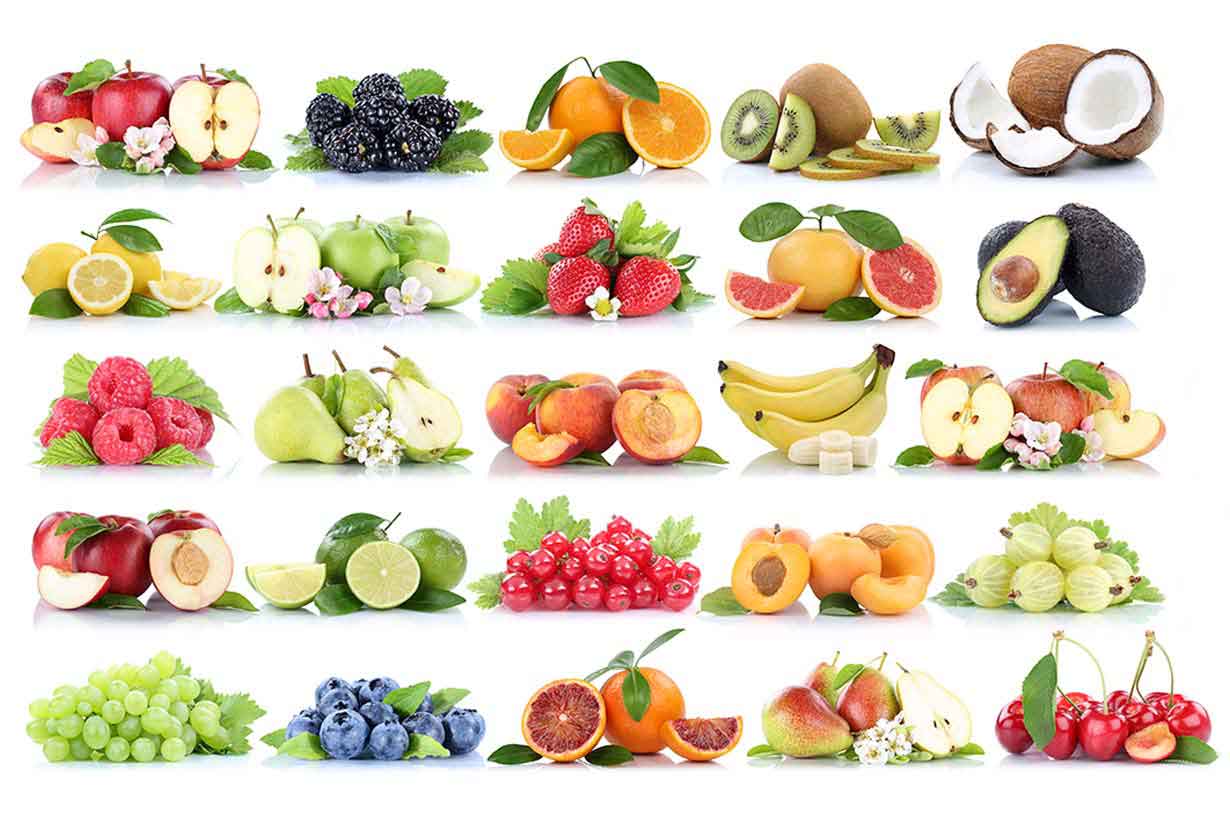
Nutritious healthy fruits are those that are not only delicious but also packed with essential nutrients that promote overall well-being. These fruits are rich in vitamins, minerals, antioxidants, and dietary fiber, which contribute to various health benefits. Including a variety of these fruits in your diet can support immune function, digestion, heart health, and more.
Some examples of nutritious healthy fruits include:
Berries (Blueberries, Strawberries, Raspberries, Blackberries)
.jpg)
Berries, including blueberries, strawberries, raspberries, and blackberries, are not only visually appealing and delicious, but they also pack a powerful nutritional punch. These tiny fruits are celebrated for their vibrant colors, sweet-tart flavors, and a wide range of health benefits that contribute to overall well-being.
Blueberries: A Brain-Boosting Superfood

Blueberries are often hailed as a "superfood" due to their exceptional antioxidant content, particularly anthocyanins. These compounds give blueberries their deep blue color and have been linked to improved cognitive function, memory retention, and brain health. Blueberries are also rich in vitamin C, vitamin K, and dietary fiber, which promote cardiovascular health, support the immune system, and aid in digestion.
Strawberries: Vitamin C Powerhouse

Strawberries are renowned for their bright red color and juicy sweetness. They are an excellent source of vitamin C, a potent antioxidant that supports immune health, collagen production, and skin vitality. Strawberries also contain folate, manganese, and dietary fiber, which contribute to heart health, bone strength, and digestive regularity.
Raspberries: Fiber-Rich Delights

Raspberries boast a delicate balance of sweet and tangy flavors. They stand out for their high dietary fiber content, which promotes digestive health and helps maintain steady blood sugar levels. Raspberries are also rich in antioxidants like quercetin and ellagic acid, which have anti-inflammatory and potential anti-cancer properties.
Blackberries: Rich in Vitamins and Minerals

Blackberries are dark, juicy berries known for their distinctive taste and remarkable nutrient profile. They are packed with vitamins C and K, as well as manganese and folate. These nutrients contribute to bone health, blood clotting, and overall immune function. Blackberries are also a good source of anthocyanins, which offer antioxidant protection against oxidative stress.
Health Benefits of Berries:
1. Antioxidant Power: Berries are loaded with antioxidants that help combat oxidative stress and reduce the risk of chronic diseases.
2. Heart Health: The fiber, potassium, and antioxidants in berries contribute to cardiovascular health by managing blood pressure and reducing inflammation.
3. Brain Function: The compounds in berries, especially blueberries, have been linked to improved cognitive function and memory.
4. Digestive Wellness: The dietary fiber in berries supports digestive health and helps regulate bowel movements.
5. Skin Health: The vitamins, antioxidants, and water content in berries promote healthy skin by fighting free radicals and maintaining hydration.
Incorporating Berries into Your Diet:
1. Enjoy them as a standalone snack.
2. Add them to yogurt, oatmeal, or cereal for a burst of flavor and nutrition.
3. Blend them into smoothies for a refreshing treat.
4. Include them in salads for a colorful and nutritious twist.
5. Use them to create delectable desserts like berry parfaits or cobblers.
Berries are not only delightful to the taste buds but also offer a plethora of health-enhancing properties. Including a variety of berries in your diet can contribute to your overall health and well-being.
Citrus Fruits (Oranges, Grapefruits, Lemons, Limes)
.jpg)
Citrus fruits, including oranges, grapefruits, lemons, and limes, are renowned for their refreshing flavors and vibrant colors. These fruits are not only a delicious addition to your diet but also provide an array of essential nutrients that contribute to your overall health and well-being.
Oranges: Vitamin C Boosters
Oranges are perhaps the most iconic citrus fruit, known for their sweet-tart taste and high vitamin C content. Vitamin C is a powerful antioxidant that supports immune health, collagen synthesis for skin elasticity, and wound healing. Oranges also provide dietary fiber, potassium, and various B vitamins, making them a well-rounded nutritional choice.
Grapefruits: Weight Management Allies
Grapefruits come in different varieties, ranging from sweet to tangy. They are recognized for their role in weight management due to their ability to curb appetite and aid in metabolism regulation. Grapefruits are rich in fiber and have a low glycemic index, making them a satisfying snack for those looking to manage their weight.
Lemons: Refreshing Detoxifiers
Lemons are known for their bright yellow color and invigorating aroma. They are a rich source of vitamin C and citric acid, which contribute to immune support and may aid in digestion. Lemons are also often associated with detoxification due to their ability to stimulate the liver and promote the elimination of toxins from the body.
Limes: Immune-Boosting Antioxidants
Limes are similar to lemons in terms of flavor and nutritional content. They are another excellent source of vitamin C, which plays a vital role in immune system function and overall health. Limes also contain flavonoids and antioxidants that contribute to reducing inflammation and promoting heart health.
Health Benefits of Citrus Fruits:
1. Immune Support: The high vitamin C content in citrus fruits strengthens the immune system and helps the body ward off infections.
2. Skin Health: Vitamin C promotes collagen synthesis, contributing to healthy and radiant skin.
3. Digestive Health: The dietary fiber in citrus fruits aids digestion and supports a healthy gut.
4. Heart Health: The potassium and flavonoids in citrus fruits help maintain healthy blood pressure levels and reduce the risk of cardiovascular diseases.
5. Antioxidant Protection: The antioxidants in citrus fruits, including vitamin C and flavonoids, combat oxidative stress and cellular damage.
Incorporating Citrus Fruits into Your Diet:
1. Enjoy them as a refreshing snack on their own.
2. Add citrus segments to salads for a burst of flavor and color.
3. Squeeze fresh lemon or lime juice onto dishes for a zesty touch.
4. Create homemade citrus-infused water for a flavorful and hydrating beverage.
5. Use citrus fruits to make marinades, dressings, and desserts.
Citrus fruits not only provide a zing of flavor but also deliver a myriad of health benefits. Including a variety of these fruits in your diet can contribute to improved well-being and vitality.
Apples
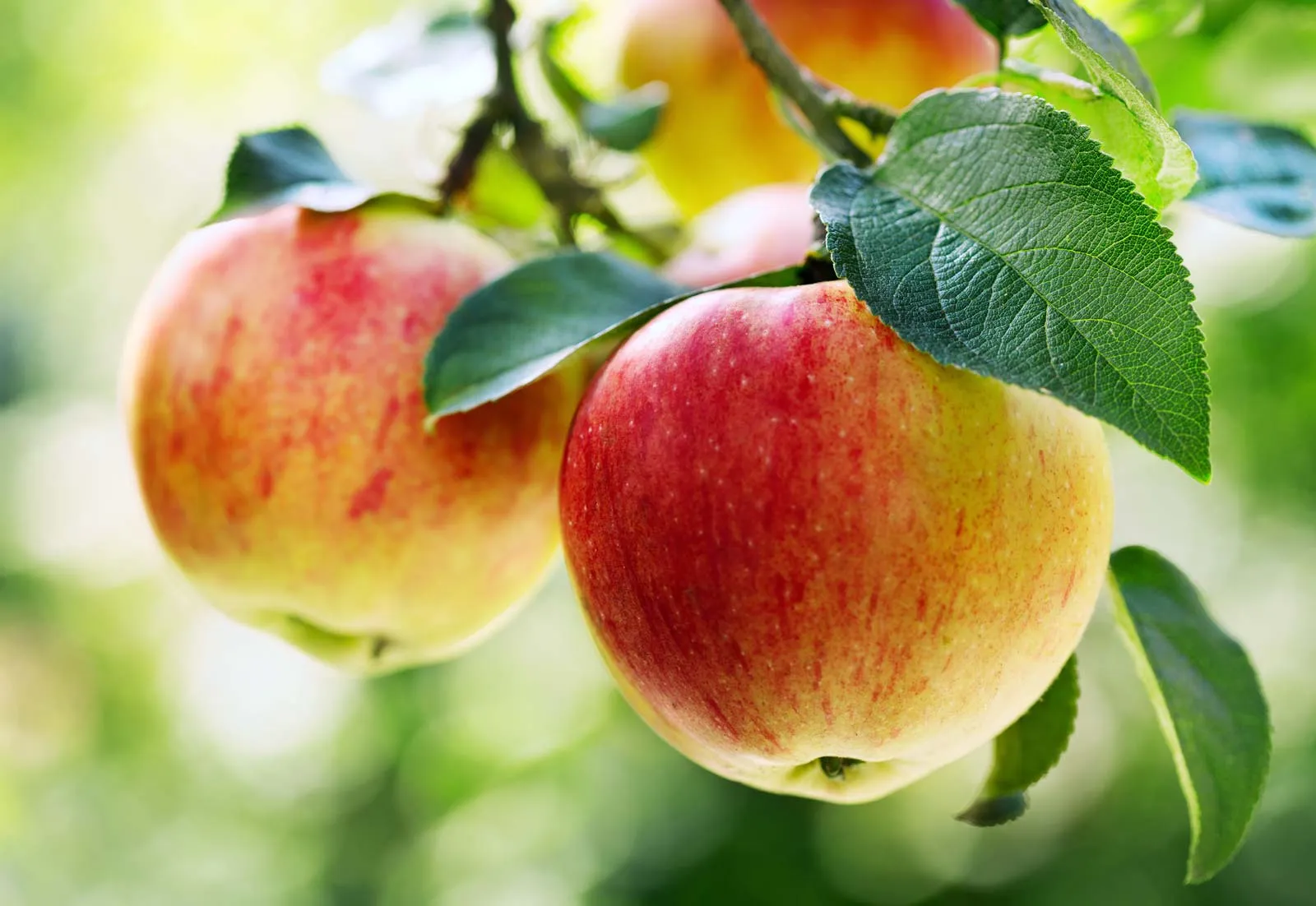
Apples, often referred to as "nature's candy," are among the most widely consumed fruits globally. With their crisp texture and naturally sweet flavor, apples offer not only a satisfying snack but also a wealth of health benefits that make them an essential part of a balanced diet.
Nutritional Profile of Apples:
Apples are low in calories and fat, making them an excellent choice for those aiming to maintain or achieve a healthy weight. They are a good source of dietary fiber, particularly soluble fiber known as pectin. Apples also provide essential vitamins, minerals, and antioxidants.
Health Benefits of Apples:
1. Dietary Fiber for Digestive Health: Apples are rich in dietary fiber, which promotes healthy digestion and aids in preventing constipation. The soluble fiber, pectin, acts as a prebiotic, supporting the growth of beneficial gut bacteria.
2. Heart Health: The fiber and antioxidants in apples contribute to heart health. Apples may help lower LDL cholesterol levels, reduce blood pressure, and decrease the risk of cardiovascular diseases.
3. Blood Sugar Regulation: The fiber content in apples slows down the digestion and absorption of sugars, helping to prevent rapid spikes in blood sugar levels. This can be particularly beneficial for individuals with diabetes.
4. Antioxidant Protection: Apples contain antioxidants like quercetin and catechins, which combat oxidative stress and inflammation. These antioxidants are associated with reducing the risk of chronic diseases, including certain cancers.
5. Weight Management: Apples' high water and fiber content create a feeling of fullness, making them a satisfying snack that can help control appetite and calorie intake.
6. Bone Health: Apples provide small amounts of bone-supporting nutrients like vitamin C and potassium. These nutrients contribute to maintaining bone density and overall skeletal health.
7. Hydration: Apples have a high water content, which aids in staying hydrated and supports various bodily functions.
Varieties of Apples:
There is a wide range of apple varieties, each with its unique flavor, texture, and color. Some popular apple varieties include Red Delicious, Granny Smith, Fuji, Honeycrisp, and Gala. Different varieties are suited for various culinary purposes, from snacking to baking and cooking.
Incorporating Apples into Your Diet:
1. Enjoy apples as a convenient and portable snack.
2. Add sliced apples to oatmeal, yogurt, or cereal for extra flavor and texture.
3. Incorporate apples into salads for a sweet and crunchy element.
4. Use apples as a natural sweetener in smoothies and baked goods.
5. Pair apples with nut butter for a balanced and satisfying snack.
6. Experiment with cooking apples into sauces, chutneys, and desserts.
Apples are not only delicious but also offer a diverse array of health benefits. Incorporating this wholesome fruit into your daily diet can contribute to improved well-being and overall vitality.
Bananas

Bananas are one of the most beloved and popular fruits worldwide. Their sweet and creamy flesh, paired with a convenient peel, makes them a convenient and nutritious snack option. Packed with essential nutrients, bananas offer numerous health benefits that contribute to overall well-being.
Nutritional Profile of Bananas:
Bananas are a rich source of carbohydrates, particularly natural sugars like glucose, fructose, and sucrose, which provide a quick energy boost. They are also high in dietary fiber, especially soluble fiber, which aids digestion and supports gut health. Bananas contain essential vitamins and minerals, including vitamin C, vitamin B6, and potassium.
Health Benefits of Bananas:
Energy and Workout Fuel: The natural sugars in bananas, combined with their carbohydrates, make them an excellent choice for a pre- or post-workout snack, providing a quick and sustained source of energy.
1. Digestive Health: The dietary fiber in bananas helps regulate bowel movements and supports a healthy digestive system. They can be particularly beneficial for individuals dealing with constipation.
2. Heart Health: The high potassium content in bananas contributes to maintaining healthy blood pressure levels and heart function. Potassium helps counteract the negative effects of sodium on blood pressure.
3. Blood Sugar Regulation: Bananas have a low glycemic index, meaning they cause a slower rise in blood sugar levels compared to high-sugar foods. This quality makes them a suitable option for managing blood sugar levels.
4. Bone Health: Bananas contain small amounts of nutrients like vitamin C, manganese, and magnesium, which play a role in maintaining strong and healthy bones.
5. Immune Support: The vitamin C content in bananas supports immune system function and helps the body combat infections and illnesses.
6. Mood Enhancement: Bananas contain tryptophan, an amino acid that helps the body produce serotonin, a neurotransmitter associated with mood regulation and overall well-being.
7. Skin Health: The vitamin C and antioxidants in bananas contribute to healthy skin by promoting collagen synthesis and protecting cells from oxidative stress.
Ripeness and Culinary Uses:
Bananas undergo a transformation as they ripen. As they become riper, their starch content converts into sugars, making them sweeter. While unripe bananas are firmer and less sweet, ripe bananas are softer and offer a more intense flavor.
Bananas are incredibly versatile in the kitchen and can be enjoyed in various ways:
1. Snack on them as is for a quick energy boost.
2. Add sliced bananas to cereal, yogurt, or oatmeal.
3. Incorporate bananas into smoothies for natural sweetness.
4. Use mashed bananas as a binding agent in baking recipes.
5. Freeze ripe bananas to create a creamy and nutritious base for homemade ice cream.
Whether consumed on their own, added to dishes, or blended into beverages, bananas offer a delightful combination of flavor, nutrition, and convenience. Incorporating this fruit into your diet can help support overall health and well-being.
Kiwi

Kiwi, also known as the "kiwifruit" or "Chinese gooseberry," is a small but mighty fruit that packs a powerful punch of nutrients and health benefits. With its vibrant green flesh and distinctive appearance, kiwi is not only delicious but also a valuable addition to a nutritious diet.
Nutritional Profile of Kiwi:
Kiwi is a nutritional powerhouse, rich in a variety of essential vitamins, minerals, and antioxidants. It is notably high in vitamin C, vitamin K, and dietary fiber. Additionally, kiwi contains vitamin E, vitamin A, folate, potassium, and trace amounts of other beneficial nutrients.
Health Benefits of Kiwi:
1. Immune System Boost: Kiwi is renowned for its exceptional vitamin C content, which supports the immune system's function and helps the body fend off infections and illnesses.
2. Digestive Health: The dietary fiber in kiwi aids in digestion, promotes healthy bowel movements, and supports gut health by providing prebiotics that feed beneficial gut bacteria.
3. Heart Health: The high potassium content in kiwi contributes to maintaining healthy blood pressure levels, while the fiber content assists in managing cholesterol levels and reducing the risk of heart disease.
4. Eye Health: Kiwi contains zeaxanthin and lutein, antioxidants known for their role in promoting eye health and reducing the risk of age-related macular degeneration.
5. Skin Health: The combination of vitamin C and antioxidants in kiwi helps protect the skin from oxidative damage and supports collagen synthesis, which is essential for maintaining skin elasticity and reducing signs of aging.
6. Bone Health: The presence of vitamin K in kiwi is beneficial for bone health, as it assists in calcium absorption and contributes to bone density.
7. Anti-Inflammatory Effects: Kiwi contains natural compounds that possess anti-inflammatory properties, helping to combat chronic inflammation, which is associated with various health issues.
8. Weight Management: The dietary fiber in kiwi contributes to a feeling of fullness, making it a satisfying snack option for those seeking weight management.
Choosing and Preparing Kiwi:
When selecting kiwis, look for ones that are firm but yield slightly to gentle pressure. Avoid those that are overly soft or have wrinkles. Kiwis can be consumed with the skin, which is edible and provides additional fiber. If preferred, you can peel the skin with a knife or scoop out the flesh with a spoon.
Culinary Uses of Kiwi:
Kiwi's unique combination of sweet and tangy flavors makes it a versatile ingredient in both sweet and savory dishes:
1. Eat kiwi slices as a standalone snack.
2. Add kiwi to fruit salads for a burst of color and flavor.
3. Incorporate kiwi into smoothies and yogurt bowls.
4. Use kiwi as a topping for oatmeal or cereal.
5. Pair kiwi with proteins like chicken or fish to create a unique salsa or sauce.
With its vibrant appearance, delicious taste, and an array of health benefits, kiwi is a delightful and nutritious addition to your diet. Including this exotic fruit in your daily meals can contribute to overall wellness and vitality.
Pears
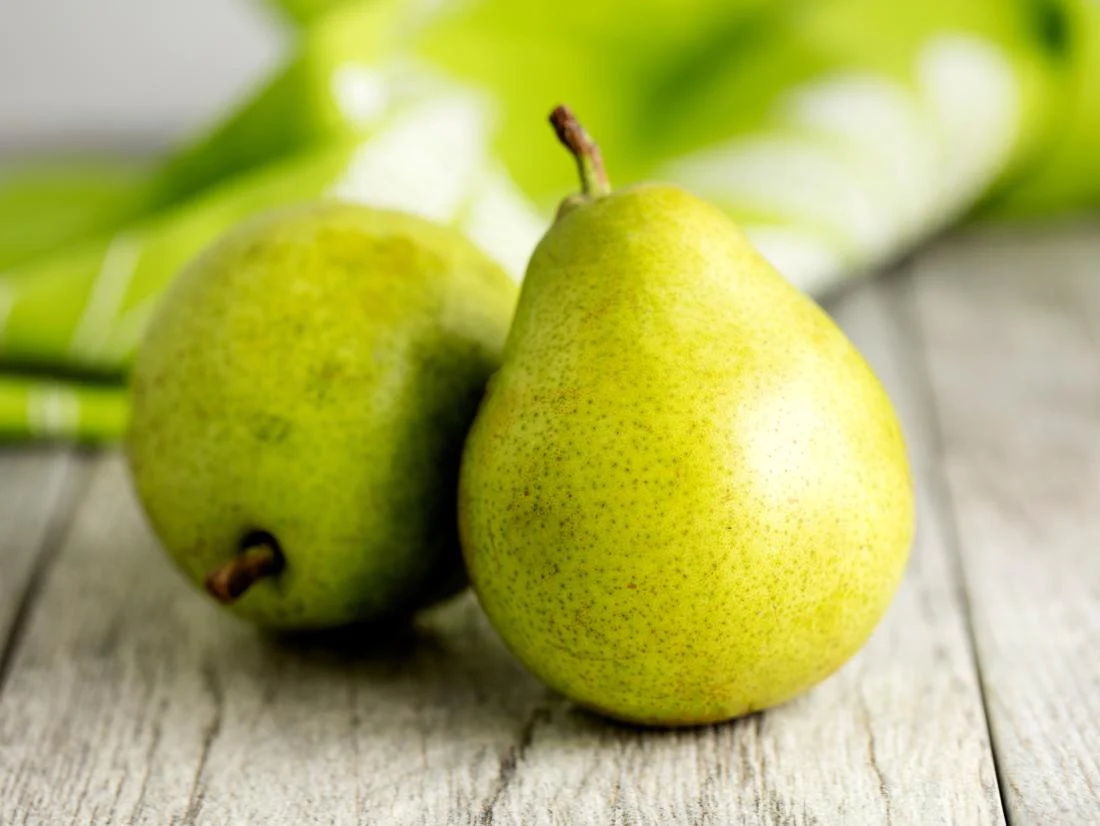
Pears are delicious and versatile fruits that come in various shapes, sizes, and colors. They are enjoyed worldwide for their sweet and juicy flavor, making them a popular choice for snacking, baking, cooking, and even adding to salads. Pears not only satisfy your taste buds but also provide a wide range of nutrients and health benefits.
Nutritional Profile of Pears:
Pears are low in calories and an excellent source of dietary fiber, which is essential for maintaining digestive health and promoting a feeling of fullness. They also contain a variety of vitamins and minerals, including vitamin C, vitamin K, potassium, and copper. Pears are naturally fat-free and cholesterol-free.
Health Benefits of Pears:
Digestive Health: Pears are a great source of dietary fiber, both soluble and insoluble. Fiber aids in promoting regular bowel movements, preventing constipation, and supporting a healthy gut.
1. Heart Health: The potassium content in pears helps regulate blood pressure and maintain proper heart function. Additionally, the dietary fiber and antioxidants in pears contribute to lowering cholesterol levels, reducing the risk of heart disease.
2. Weight Management: Pears are relatively low in calories and high in water content, making them a satisfying snack option for those looking to manage their weight.
3. Blood Sugar Regulation: The fiber content in pears slows down the digestion and absorption of sugars, helping to stabilize blood sugar levels and reducing the risk of type 2 diabetes.
4. Antioxidant Protection: Pears are a good source of antioxidants, including vitamin C and copper, which help protect cells from oxidative damage and promote overall health.
5. Bone Health: The vitamin K in pears plays a role in bone health by aiding in calcium absorption and contributing to bone density.
6. Hydration: With their high water content, pears can contribute to your daily hydration needs, keeping your body hydrated and supporting various bodily functions.
7. Skin Health: The vitamins and antioxidants found in pears contribute to healthy skin by protecting against damage from free radicals and promoting collagen synthesis.
Choosing and Preparing Pears:
When selecting pears, choose ones that are firm but not too hard. Pears continue to ripen after being picked, so if you prefer a softer texture, allow them to ripen at room temperature. Once ripe, pears can be refrigerated to prolong their freshness. Pears can be eaten as is, skin and all, or peeled if desired. They can also be sliced, diced, or used in a variety of culinary creations, both sweet and savory.
Culinary Uses of Pears:
1. Enjoy fresh pears as a quick and nutritious snack.
2. Add sliced pears to salads for a burst of sweetness and texture.
3. Incorporate pears into smoothies for added flavor and nutrition.
4. Bake pears in the oven with a sprinkle of cinnamon for a warm and comforting treat.
5. Poach pears in a mixture of water, sugar, and spices for an elegant dessert.
6. Pair pears with cheese for a delicious appetizer.
Whether eaten on their own, added to dishes, or used in recipes, pears are a delightful and healthful addition to your diet. With their pleasing taste and array of nutritional benefits, pears offer a great way to indulge in both flavor and wellness.
Watermelon
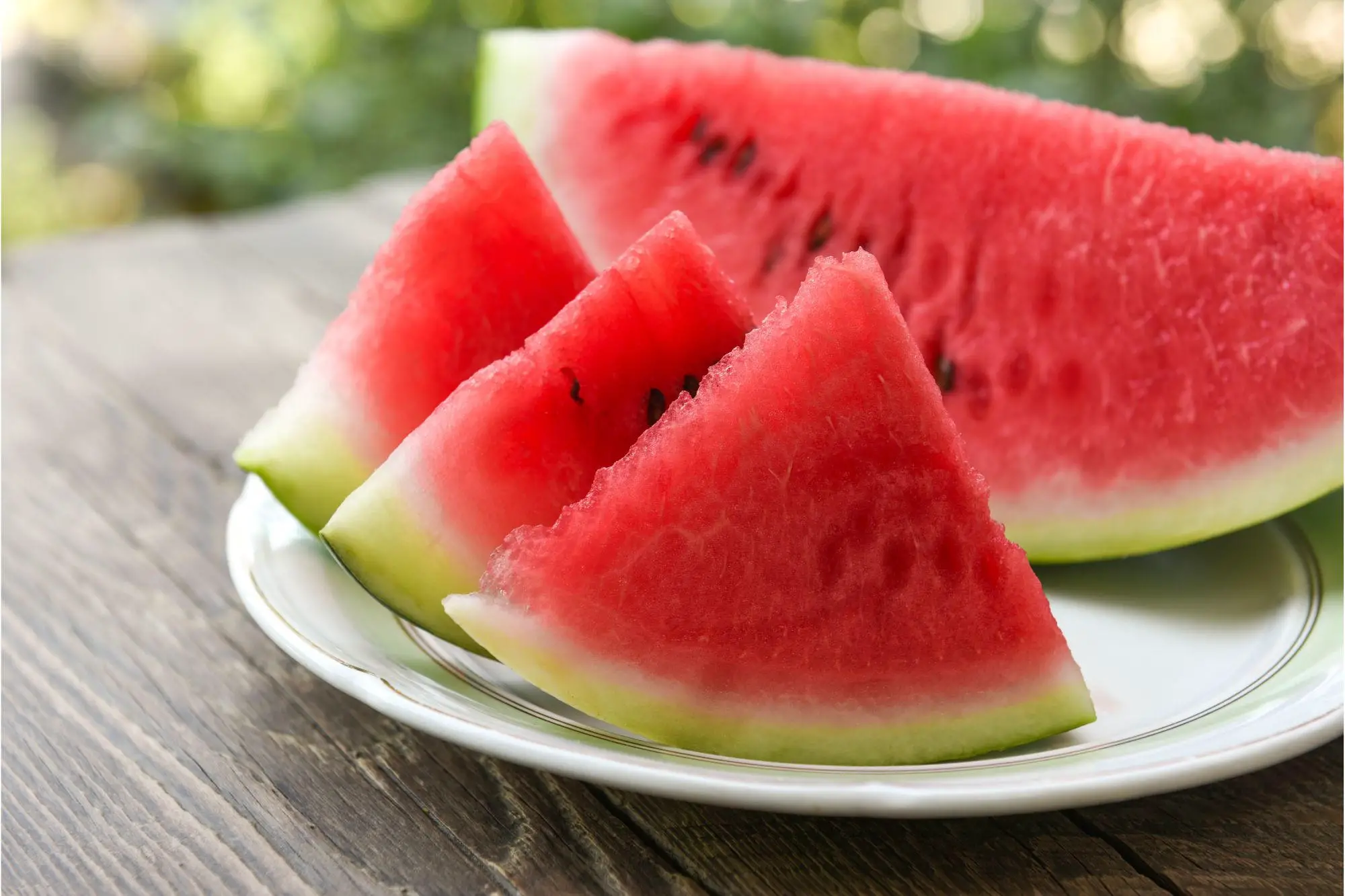
Watermelon is a beloved summer fruit known for its juicy and hydrating nature. Its vibrant red or pink flesh, combined with its refreshing taste, makes it a popular choice for staying cool and quenching thirst during hot months. Beyond its deliciousness, watermelon offers a range of health benefits, making it a delightful addition to your diet.
Nutritional Profile of Watermelon:
Watermelon is low in calories and consists mostly of water, making it an excellent choice for staying hydrated. It's a good source of vitamins and minerals, particularly vitamin C, vitamin A, and potassium. Additionally, watermelon contains antioxidants like lycopene, which gives it its vibrant color and provides potential health benefits.
Health Benefits of Watermelon:
1. Hydration: With its high water content (about 90%), watermelon is a great way to keep your body hydrated, especially during hot weather or after physical activity.
2. Heart Health: Watermelon contains citrulline, an amino acid that may help improve blood flow and relax blood vessels, contributing to heart health.
3. Anti-Inflammatory: The antioxidants present in watermelon, including vitamin C and lycopene, have anti-inflammatory properties that can help reduce oxidative stress and inflammation in the body.
4. Skin Health: The vitamin A and vitamin C in watermelon support healthy skin by promoting collagen production, which contributes to skin elasticity and a youthful appearance.
5. Digestive Health: Watermelon's high water and fiber content can aid in promoting regular bowel movements and preventing constipation.
6. Antioxidant Protection: Lycopene, a powerful antioxidant found in watermelon, may help protect cells from damage caused by free radicals, potentially lowering the risk of chronic diseases.
7. Muscle Soreness: Some studies suggest that the amino acid citrulline in watermelon may help alleviate muscle soreness after exercise by reducing muscle fatigue.
Choosing and Preparing Watermelon:
When selecting a watermelon, look for one that feels heavy for its size and has a uniform shape without any soft spots or bruises. A ripe watermelon should have a dull, matte finish on its surface and a slightly hollow sound when tapped.
Watermelon can be enjoyed in various ways:
1. Fresh: Simply slice and eat the juicy flesh on its own.
2. Salads: Add watermelon chunks to fruit salads or mixed greens for a burst of sweetness and color.
3. Smoothies: Blend watermelon with other fruits and liquids for a refreshing and hydrating beverage.
4. Sorbet: Freeze watermelon cubes and blend them for a homemade sorbet-like treat.
5. Grilled: Watermelon can also be grilled for a unique flavor experience.
6. Infused Water: Use watermelon cubes to infuse water with a naturally fruity flavor.
Pomegranates
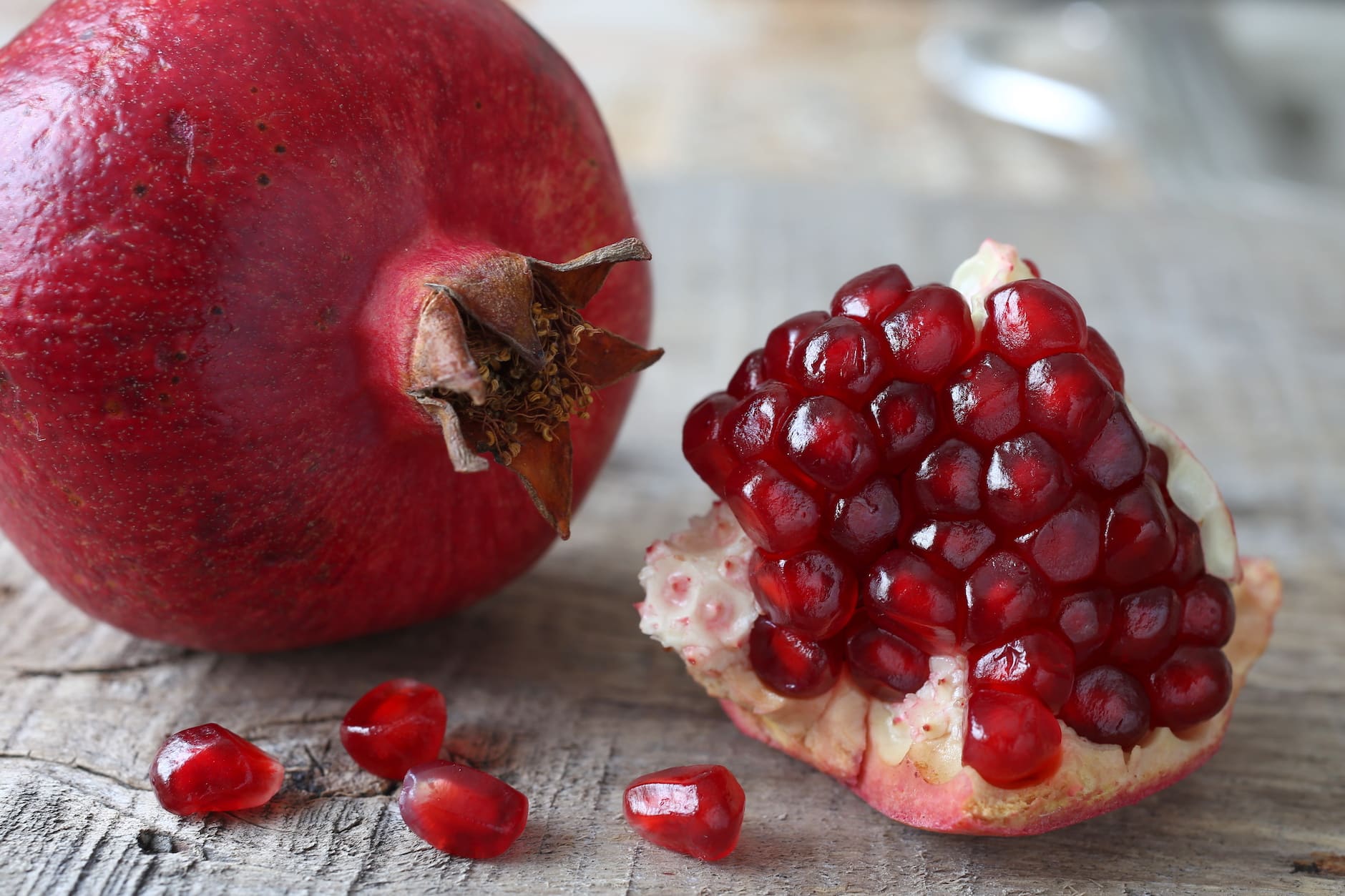
Pomegranates are often referred to as "nature's jewels" due to their vibrant red color and the treasure trove of health benefits they offer. This unique fruit is prized not only for its delicious taste but also for its potential to support overall health and well-being. From its rich history to its impressive nutrient content, pomegranates have earned their place as a super fruit with a wide range of benefits.
Nutritional Profile of Pomegranates:
Pomegranates are packed with a variety of essential nutrients, making them a true powerhouse of nutrition. They are a rich source of antioxidants, including vitamin C and polyphenols, such as flavonoids and tannins. Pomegranates also contain vitamins like vitamin K and minerals like potassium.
Health Benefits of Pomegranates:
1. Antioxidant Powerhouse: Pomegranates are loaded with antioxidants that help combat oxidative stress and reduce inflammation in the body. These antioxidants play a role in protecting cells from damage caused by harmful free radicals.
2. Heart Health: Pomegranates have been linked to improved heart health. They may help lower blood pressure, reduce cholesterol levels, and enhance the function of blood vessels, all of which contribute to a healthier cardiovascular system.
3. Cancer Prevention: Some studies suggest that the potent antioxidants in pomegranates may have anticancer properties, particularly against certain types of cancer like breast and prostate cancer.
4. Anti-Inflammatory Properties: The anti-inflammatory effects of pomegranates may contribute to improved joint health and reduced risk of chronic inflammatory conditions.
5. Digestive Health: Pomegranates contain dietary fiber, which supports healthy digestion by promoting regular bowel movements and supporting gut health.
6. Skin Benefits: The antioxidants in pomegranates may help protect the skin from damage caused by UV radiation and environmental pollutants. They may also contribute to collagen production, promoting skin elasticity and a youthful appearance.
7. Brain Health: Some research suggests that pomegranates could have a positive impact on cognitive function and memory, potentially reducing the risk of neurodegenerative diseases like Alzheimer's.
8. Immune Boost: The vitamin C content of pomegranates supports the immune system, helping the body fight off infections and illnesses.
Enjoying Pomegranates:
Pomegranates can be enjoyed in various ways:
1. Seeds: The juicy seeds, also called arils, are the most commonly consumed part of the fruit. They can be eaten on their own, added to salads, or used as a topping for yogurt and desserts.
2. Juice: Pomegranate juice is available commercially and can be enjoyed as a refreshing drink or used as a base for smoothies.
3. Smoothies: Blend pomegranate seeds or juice with other fruits for a nutritious and flavorful smoothie.
4. Dressings and Sauces: Pomegranate juice or seeds can be used to make dressings, sauces, and marinades.
Grapes

Grapes are not just a favorite fruit for snacking; they are also a nutritional powerhouse that offers a wide range of health benefits. Available in various colors and types, including red, green, and black, grapes are enjoyed all around the world for their delicious taste and potential to support overall well-being.
Nutritional Profile of Grapes:
Grapes are a rich source of vitamins, minerals, and antioxidants. They are particularly known for their high content of polyphenols, which contribute to their vibrant colors and numerous health benefits. Grapes are also a good source of vitamin C, vitamin K, and dietary fiber.
Health Benefits of Grapes:
1. Heart Health: Grapes are associated with heart health due to their content of antioxidants, such as resveratrol and flavonoids. These compounds may help reduce the risk of heart disease by improving blood pressure, reducing cholesterol levels, and supporting healthy blood vessel function.
2. Antioxidant Protection: The polyphenols in grapes have powerful antioxidant properties that help protect cells from oxidative stress and damage caused by free radicals. This can contribute to overall cellular health and reduced risk of chronic diseases.
3. Brain Health: Resveratrol, a compound found in grapes, has been studied for its potential to support brain health. It may enhance cognitive function and help protect against neurodegenerative diseases.
4. Digestive Health: Grapes are a good source of dietary fiber, which promotes healthy digestion by supporting regular bowel movements and gut health.
5. Bone Health: Grapes contain vitamins and minerals like calcium, magnesium, and vitamin K, which play a role in maintaining strong and healthy bones.
6. Immune Support: The vitamin C content of grapes supports the immune system, helping the body fight off infections and illnesses.
7. Skin Benefits: The antioxidants in grapes may help protect the skin from damage caused by UV radiation and environmental pollutants, promoting a healthy complexion.
8. Anti-Inflammatory Properties: Some compounds found in grapes, including resveratrol, have anti-inflammatory effects that can help reduce inflammation and contribute to overall well-being.
Enjoying Grapes:
Grapes are versatile and can be enjoyed in a variety of ways:
1. Fresh: Grapes can be enjoyed as a convenient and nutritious snack on their own.
2. Add to Salads: Toss grapes into salads to add a burst of sweetness and texture.
3. Smoothies: Blend grapes with other fruits and vegetables to create delicious and refreshing smoothies.
4. Dried Grapes (Raisins): Grapes can be dried to make raisins, a portable and energy-dense snack.
5. Grapes as a Topping: Add sliced grapes as a topping for yogurt, oatmeal, or cereal.
Mangoes

Mangoes are often hailed as the "king of fruits" due to their delightful taste, juicy texture, and incredible versatility in culinary creations. These tropical fruits are cherished by people around the world for their rich flavor and impressive nutritional profile.
Nutritional Profile of Mangoes:
Mangoes are a rich source of essential nutrients, including vitamins, minerals, and dietary fiber. They are particularly known for their high content of vitamin C and vitamin A (in the form of beta-carotene), as well as potassium and folate.
Health Benefits of Mangoes:
1. Rich in Antioxidants: Mangoes are loaded with antioxidants, including vitamin C and various phytochemicals, which help protect cells from oxidative stress and contribute to overall health.
2. Supports Immune System: The high vitamin C content of mangoes plays a crucial role in boosting the immune system and defending the body against infections and illnesses.
3. Eye Health: The beta-carotene content in mangoes supports eye health and may help reduce the risk of age-related macular degeneration.
4. Digestive Health: Mangoes contain dietary fiber, which aids in digestion, promotes regular bowel movements, and supports gut health.
5. Healthy Skin: The vitamins and antioxidants in mangoes contribute to healthy and glowing skin. They help maintain skin elasticity and may reduce the signs of aging.
6. Bone Health: Mangoes provide nutrients like vitamin K and calcium that contribute to strong and healthy bones.
7. Heart Health: The potassium content of mangoes helps regulate blood pressure levels, contributing to heart health.
8. Alkalizing Properties: Despite being naturally sweet, mangoes have alkalizing properties that help balance the body's pH levels.
Varieties of Mangoes:
There are numerous varieties of mangoes, each with its unique flavor, aroma, and texture. Some popular varieties include Alphonso, Kent, Haden, Ataulfo, and Tommy Atkins.
Enjoying Mangoes:
Mangoes can be enjoyed in various ways:
1. Fresh: Simply peel and slice ripe mangoes for a refreshing and juicy snack.
2. Smoothies: Blend mangoes with yogurt or milk to create creamy and delicious smoothies.
3. Salads: Add mango slices to fruit salads or savory salads for a burst of sweetness.
4. Salsas: Create flavorful salsas by combining diced mangoes with onions, peppers, and herbs.
5. Frozen Treats: Make mango popsicles or sorbets for a cooling and healthy dessert.
Incorporating a variety of these healthy fruits into your diet can contribute to a balanced and nutritious eating pattern. Remember that individual dietary needs may vary, so it's important to enjoy a diverse range of fruits and other foods as part of a well-rounded diet.
What are the benefits of eating healthy nutritious fruits?

Eating healthy and nutritious fruits offers a wide range of benefits for your overall health and well-being. These fruits are packed with vitamins, minerals, antioxidants, and dietary fiber that support various bodily functions and contribute to long-term health. Here are some key benefits of including nutritious fruits in your diet:
1. Boosts Immune System: Many nutritious fruits, such as citrus fruits and berries, are rich in vitamin C and other antioxidants that strengthen your immune system, helping your body fight off infections and illnesses.
2. Supports Heart Health: Fruits like berries, grapes, and citrus fruits contain compounds that promote heart health by reducing inflammation, improving blood vessel function, and lowering blood pressure.
3. Aids Digestion: Fruits with dietary fiber, such as apples, pears, and kiwi, support digestive health by promoting regular bowel movements, preventing constipation, and supporting a healthy gut microbiome.
4. Promotes Skin Health: Nutrient-rich fruits provide vitamins like vitamin A, vitamin C, and antioxidants that contribute to healthy skin, collagen production, and protection against UV damage.
5. Manages Weight: Nutrient-dense fruits are often low in calories and high in water content, making them satisfying while helping control calorie intake and aiding weight management.
6. Improves Cognitive Function: Antioxidant-rich fruits, especially berries, have been linked to improved cognitive function and a reduced risk of age-related cognitive decline.
7. Enhances Eye Health: Fruits like carrots (rich in beta-carotene), oranges (rich in vitamin C), and dark leafy greens (rich in lutein) support eye health and reduce the risk of vision problems.
8. Regulates Blood Sugar: Some fruits, such as berries and cherries, have a lower glycemic index and can help regulate blood sugar levels, making them suitable choices for individuals with diabetes.
9. Provides Natural Energy: Fruits like bananas are excellent sources of carbohydrates and potassium, providing a quick and natural source of energy for physical activities.
10. Reduces Chronic Disease Risk: The antioxidants and phytochemicals found in many fruits contribute to reducing the risk of chronic diseases, including heart disease, diabetes, and certain types of cancer.
11. Supports Bone Health: Fruits rich in vitamin K, calcium, and magnesium, such as oranges and kiwi, play a role in maintaining strong and healthy bones.
12. Aids Hydration: Many fruits have high water content, helping you stay hydrated and supporting various bodily functions.
13. Provides Natural Sweetness: Healthy fruits can satisfy sweet cravings without the negative effects of added sugars found in processed sweets.
Incorporating a variety of nutritious fruits into your daily diet can help you enjoy these benefits and maintain a balanced and wholesome lifestyle. Remember that individual nutritional needs may vary, so it's important to create a diverse and well-rounded eating plan that includes a variety of nutrient-rich foods.

